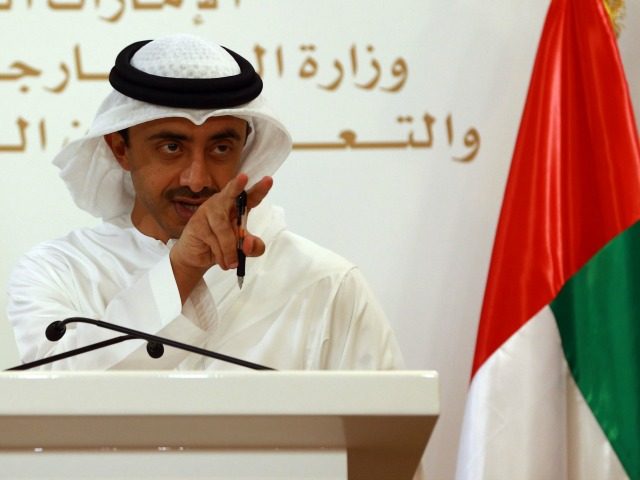The foreign minister of the United Arab Emirates (UAE), Sheikh Abdullah bin Zayed Al Nahyan, told the United Nations General Assembly on Tuesday his nation’s decision to normalize diplomatic relations with Israel helped the Palestinian people.
Al Nahyan asserted that UAE remained “firm” in its commitment to the establishment of a Palestinian state and that friendly relations with Israel were part of that policy, not a deviation from it.
The UAE announced this month it would recognize Israel as a sovereign state and fully normalize relations, meaning allowing air travel, recognizing Israeli citizenship, and opening up trade with the country. Bahrain, another Gulf neighbor, soon followed, and both signed their agreements with Israeli leaders at the White House this month. The Trump administration played a major role in getting the two sides to the negotiating table and thus hosted them to sign what is now known as the Abraham Accords.
UAE and Bahrain became the third and fourth Arab states – after Egypt and Jordan – to recognize Israel.
The UAE move also resulted in Saudi Arabia, a close ally of Abu Dhabi’s, permitting planes to fly over Saudi airspace when traveling between UAE and Israel, a major diplomatic breakthrough given Saudi Arabia’s status as home to the holiest sites in Islam.
Palestinian terrorists responded to the news by shooting rockets at Israel. An official statement from the Palestinian Authority called the peace deal “a token of support for legitimizing the ugly crimes of the Israeli occupation against the Palestinian people;” one Palestinian official called it a “stab in the back.” Various jihadist groups funded by Iran also condemned the peace deal as a “betrayal.”
At the United Nations, Al Nahyan appeared to be focused on addressing these concerns, contending that the peace deal with Israel actually resulted in preventing the country from “annexation” of territories controlled by Palestinians.
“The call for the establishment of an independent Palestinian state on the borders of 1967 with East Jerusalem as its capital in line with the relevant international resolutions and the Arab and international consensus will remain a firm demand,” Al Nahyan said. “My country has made persistent efforts using all available diplomatic channels to affirm our total rejection of the annexation of Palestinian territory, and we have warned of its impact on all parties and on the security of the region.”
“With the signing of a historic peace accord with Israel, supported by American efforts, my country was able to freeze the annexation decision and opened broad prospects to achieve a comprehensive peace in the region,” he claimed. “We hope this peace accord will provide the opportunity for the Palestinians and the Israelis to re-engage in negotiations to achieve peace. Our position towards supporting the Palestinian people and achieving the two-state solution is firm.”
Al Nahyan also expressed hope that the deal would “open new intellectual horizons in the region and create a prosperous path for future generations who deserve a stable region and a better reality than wars and poverty.”
Al Nahyan’s remarks echoed the positive sentiment by King Hamad bin Isa Al Khalifa of Bahrain during his remarks at the General Assembly last week.
“From of our keenness to preserve the security and stability of the region, and as an embodiment of our resolute approach to openness and coexistence with all, we have announced the establishment of relations with the State of Israel,” King Hamad said, “sending a civilized message affirming that our hand is extended for a just and comprehensive peace, as it is the best guarantee for the future of all peoples of the region.”
President Donald Trump, in announcing the Bahrain and UAE deals, teased that more Arab states would soon join in recognizing the legitimacy of Israel, but at press time such deals have not surfaced.
Elsewhere in his speech, Al Nahyan condemned the increasingly belligerent military behavior of neighbors Iran and Turkey. The foreign minister named Iran only in the context of a territorial dispute over Gulf islands, but made reference to “blatant interference in Arab affairs” in nations where Iran has a large terrorist presence.
“These warnings stemmed from our reality and experience,” the foreign minister said. “The tensions in Yemen, Syria, Libya, Iraq, and other states are all related to blatant interference in Arab affairs made by states that incite strife and discord, or that have historical delusions of restoring their domination and colonial rule over the Arab region and the Horn of Africa.”
“The result has been brutal wars. In this context, we recall our firm position of rejecting regional interference in Arab affairs, and request full respect for sovereignty, which is fully consistent with international law and international norms,” Al Nahyan said.
He concluded his speech announcing that UAE would run for a position on the U.N. Security Council during the 2022 year, the closest one available.

COMMENTS
Please let us know if you're having issues with commenting.